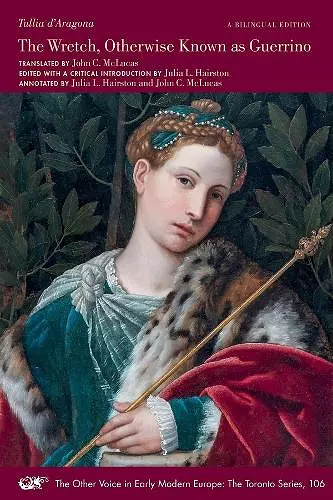The Wretch, Otherwise Known as Guerrino
A Bilingual Edition
Tullia d'Aragona author John C McLucas translator Julia L Hairston editor
Format:Paperback
Publisher:Iter Press
Published:19th Sep '25
Should be back in stock very soon

The only English translation of the first epic poem to be authored by an Italian woman.
This is an unabridged bilingual, fully annotated edition of Tullia d’Aragona’s epic poem The Wretch. This mid-century epic reflects the many historical and religious changes taking place in the first half of the sixteenth century in Europe and the burgeoning literary debates following the publication of another Italian epic poem, Ariosto’s Orlando Furioso. The Wretch recounts the adventures of Guerrino, a nobleman captured by pirates as an infant and sold into slavery. His famous quest in search of his parents and his identity involves abductions, same-sex seductions, and skirmishes with fantastical beasts as he travels through Europe, Turkey, Africa, India, Arabia, and the Purgatory of St. Patrick. The poem occupies an important position in the development of the prestigious epic genre, the highest step on the ladder to literary recognition and fame, and Tullia’s work paved the way for the epics of other women writers in subsequent decades.
"Tullia d’Aragona’s The Wretch bears the extraordinary distinction of being the first epic poem written by a woman in Italian. Basing her work on a fifteenth-century romance recounting the chivalric adventures of the Carolingian knight Guerrino, Tullia transforms the prose source into thirty-six cantos of elegant ottava rima, totaling more than 28,000 lines of hendecasyllabic verse. In her letter to her reader as well as in the proems to the cantos, she emphasizes the moral themes of the text, which champion above all the Christian faith. The English translation by John McLucas is lucid and engaging, and Julia Hairston’s rich introduction provides an immensely useful discussion of the intellectual and religious framework behind Tullia’s text. This is a great contribution to the Other Voice series, and to the history of women’s writing in the Renaissance." -- Ramie Targoff, Jehuda Reinharz Professor of the Humanities and Co-Chair of Italian Studies at Brandeis University
ISBN: 9781649591104
Dimensions: 229mm x 152mm x 61mm
Weight: 1615g
1250 pages